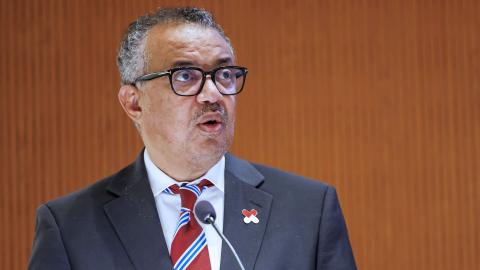
WHO Illegally Rams Through Pandemic Resolution After Countries Reject It, Critics Cry 'Tyrannical'
The World Health Organization (WHO) has illegally enacted revised International Health Regulations (IHR) that would dictate how each nation should respond if another health pandemic occurs, a new report says.
The Liberty Counsel, a non-profit legal group, has released a report claiming that after the WHO failed to pass its pandemic agreement at the 77th assembly, it then "bypassed protocol" and secretly passed a resolution that would enhance the WHO's authority and dictate how nation's report, manage, and cooperate in another infectious disease outbreak.
The group cites a report by scientist Dr. Robert W. Malone, a well-recognized physician, biochemist, and mRNA researcher, best known for raising concerns about the COVID-19 vaccines.
Malone states that "sweeping IHR amendments were prepared behind closed doors, and then both submitted for consideration and accepted by the World Health Assembly quite literally in the last moments of a meeting which stretched late into Saturday night, the last day of the meeting schedule."
WHO Director-General Tedros Ghebreyesus reportedly claimed there was a "consensus" and illegally enacted the new "legally binding" IHRs without a floor vote contrary to established rules and protocols, according to the Liberty Counsel.
As CBN News reported, WHO leaders were unable to reach an agreement for a controversial pandemic-related treaty during the May 27-June 1 World Health Assembly in Geneva.
The treaty would have increased the organization's emergency powers in case of another international health crisis. And critics warned the pandemic treaty would undermine U.S. sovereignty on important health decisions.
In 2021, member countries asked the WHO to oversee negotiations to determine how to best stop the spread of future viruses globally.
According to a draft treaty, the WHO would focus on closing the vaccine gap between the West and developing countries through a "Pathogen Access and Benefit-Sharing System," where countries would give the organization samples and genetic sequences of potentially dangerous pathogens, Semafor Signals reports.
In return, the WHO would provide countries with 20% of the vaccines needed.
However, the treaty also included proposals to increase the WHO's emergency powers and essentially give the organization full power over what other countries should do in a pandemic.
When that effort failed, another effort was pushed forth by assembly members late into the Geneva meeting.
A press release by the Sovereignty Coalition, which included several representatives from the assembly, claimed the process of adopting the IHRs in the final session "flagrantly" violated all rules and protocols.
"Tedros ignored the IHRs' Article 55.2, which requires that any amendments thereto must be made available 'at least four months' before they are eligible for adoption," explained the release. "States parties meeting at the World Health Assembly literally in the dark of night, on a Saturday no less, were not given even four hours to examine myriad proposed changes to the regulations that effectively constitute the organization's constitution."
Part of the changes to IHR included creating a "national IHR authority" that reports to the WHO and is responsible for implementing regulations on surveillance (vaccine passports/digital health certificates), risk communication (censoring misinformation and disinformation), implementation of control measures (social distancing/lockdowns), and more.
Only one-third of member nations were present for the final approval session and only 37 out of the 194 member nations supported the revised IHRs, including the U.S. delegation.
Argentina, Belarus, Costa Rica, Iran, Russia, and Slovakia were the only countries who expressed objections to the changes after it was already approved.
Therefore, the assembly ended with plans to finalize a future "pandemic agreement."
"The historic decisions taken today demonstrate a common desire by Member States to protect their own people, and the world's, from the shared risk of public health emergencies and future pandemics," Ghebreyesus said the next day.
"This is built on a commitment to equity, an understanding that health threats do not recognize national borders and that preparedness is a collective endeavor," he added.
The WHO has agreed to have its Intergovernmental Negotiating Body meet in July 2024 to continue working toward finalizing an agreement by later this year or before the 2025 World Health Assembly.
The Sovereignty Coalition is demanding prompt action from U.S. lawmakers.
"The danger is that those provisions, nonetheless, reflect the unaltered ambitions of the WHO to exercise even more tyrannical control than is immediately in prospect," the group of representatives wrote.
"The Biden administration has employed a combination of secrecy, deceptiveness, and coercion to put Tedros Ghebreyesus on track to achieve arguably the greatest concentration of power in a single individual in the course of human history," they added. "Such conduct must be repudiated by the American people and their elected representatives."
***Please sign up for CBN Newsletters and download the CBN News app to ensure you keep receiving the latest news from a distinctly Christian perspective.***




